
10 ways to keep your Christmas bubble as safe as possible
Boris Johnson is under pressure to rethink a plan to allow people from three different households to mix for five days during the festive period, and has previously warned: ’tis the season to be jolly careful’. Experts have repeatedly said that the easing of rules could lead to more infections among the elderly and a new wave of Covid-19, amid fears that may eventually plunge the country into a new lockdown.
But while researchers say it is impossible to be fully safe while mixing inside, there are a number of things — notably good ventilation, social distancing and mask wearing — that can reduce the risk.
With many relieved at the chance to see their relatives for Christmas after a turbulent year, we asked experts how to celebrate as safely as possible.
Here is what they told us – and ten ways to minimise the risk.
Professor Sally Bloomfield, from the London School of Hygiene and Tropical Medicine, explained: ‘One thing I want to stress – is that just because the government say that households can meet – that does not mean it is safe.
‘The household with more than one family seems to me to be the perfect place for it to spread – who wants to socially distance or wear a mask in their homes on Christmas day?
‘(This) advice cannot make it safe – it can only make it less risky.’
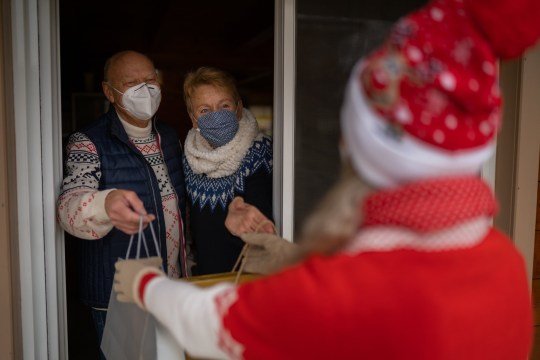
Apologising for the ‘doom and gloom’, but adding that she thinks it is ‘hard to believe’ there will not be another ‘surge in cases’ after Christmas, she gives her top five precautions as:
Social distancing – don’t kiss Granny
By now, everyone is aware of guidance on trying to stay as far apart as possible – and Professor Bloomfield emphasises that it should be at least two metres, which means the virus is less likely to pass between people.
She also works for the International Scientific Forum on Home Hygiene (IFH), and urged people to look at the organisation’s fact sheet on staying safe inside.
It specifically urges people not to kiss and hug those outside your household or play games that involve physical contact, shouting or singing.
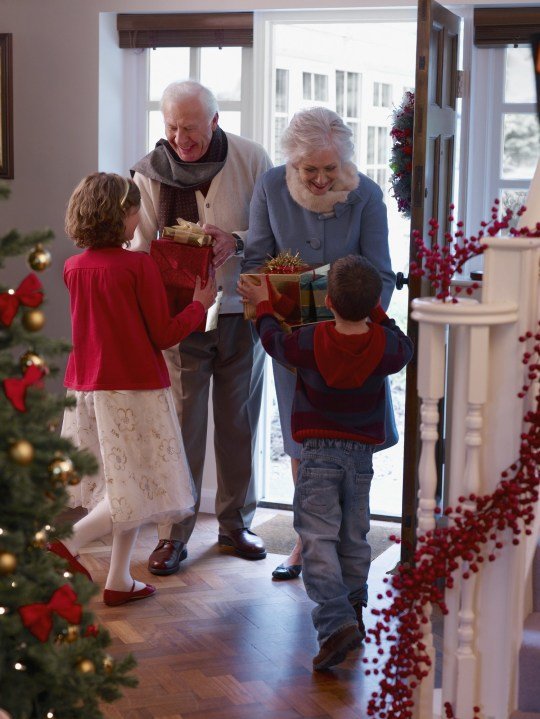
Wear a mask – yes, especially in the house
One of the fears among experts is that while in pubs, restaurants and shops, people are obliged to wear a mask, but in private homes the public are far less likely to do so.
Coughing, sneezing, singing and speaking loudly can spread the virus though droplets, but masks catch the majority of them before they can get into the air and infect others.
Families have been advised to agree on rules like mask wearing before meeting up at Christmas.
It is also important to regularly wash reusable masks.
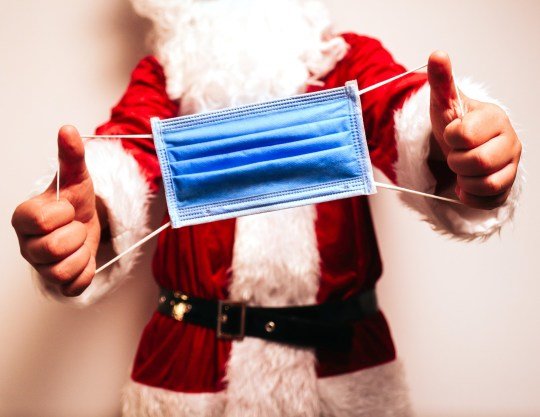
Keep the home well ventilated – windows open, jumpers on
As well as mask wearing, Professor Bloomfield thinks opening doors and windows to allow air flow is a key measure to make sure droplets do not build up in enclosed spaces. It may mean people need to wear warmer clothes, but it is also likely to significantly reduce the spread of the virus, particularly among asymptomatic carriers.
The IFH says: ‘The biggest risk comes from virus recently “breathed out”, or deposited on surfaces, by the infected person. Once they leave your home, risks from any virus they leave behind in the air or on surfaces will get less (it will die out or be removed), particularly if you keep your home ventilated’
Spend as much time outdoors as you can
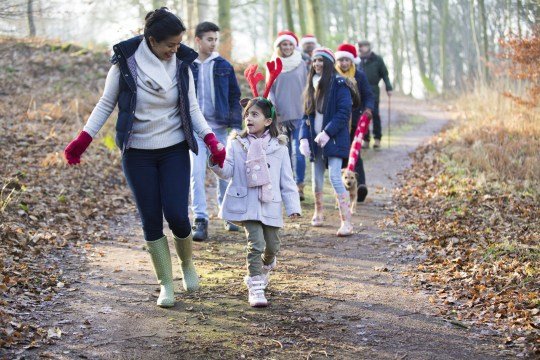
Similarly, being outside means droplets cannot build up in an enclosed space, dramatically reducing the chance of infecting those around you.
Frequent hand washing – and get the presents under the tree early
Professor Bloomfield’s final tip is one that Brits have heard regularly for months. Washing hands lessens the risk of picking up and passing on droplets.
Not touching your face – so those droplets do not enter your eyes, nose or mouth – and cleaning regularly touched surfaces, like door handles and television remotes, is also advised by the IFH.
It suggests putting presents under the tree two days early and in separate piles so everyone collects their own; as well as not sharing serving spoons or passing bowls of food.
Also off their menu, regardless of hand hygiene, are things like playing cards and sharing games console controllers.
But the IFH do suggest having hand sanitiser surface cleaners readily available to encourage regular use.
Echoing Professor Bloomfield’s position is Professor Lucy Yardley from the University of Bristol, who has led the development of the ‘Germ Defence’ app, with other behavioural psychologists from her university and at Bath and Southampton.
The app works against respiratory infections and gives personalised advice on how to protect members of a household from infection, winning it praise for its successes against Swine and seasonal flu.
Professor Yardley said: ‘Many people don’t realise that there are things they can do quite easily that will really reduce the risk of spreading the virus when family and friends visit over Christmas.’
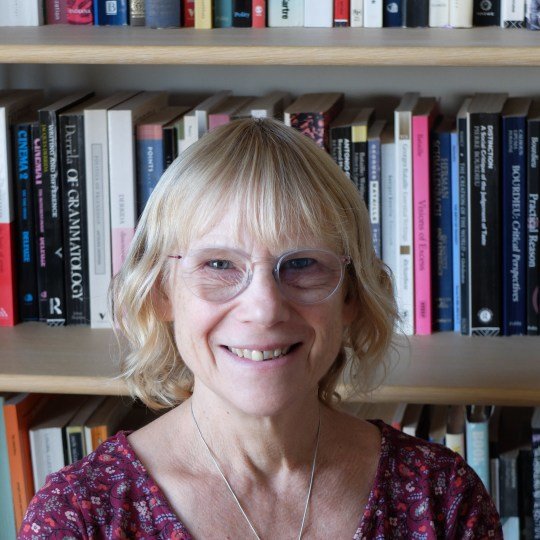
She told Metro.co.uk that her top three tips are:
Don’t meet vulnerable people
‘If someone is vulnerable then think about whether you really need to meet in person now or whether it might be better to phone them or meet them online or on the doorstep – and plan a proper celebration with them soon as they will be at the front of the queue for vaccination’, Professor Yardley says.
Don’t crowd the house
‘If you do want to meet up then try to avoid crowding the house.
‘The fewer people that meet, the lower the chance that one person will have the virus – and if they do then they will give it to fewer people. And if there are not too many people in the house at one time it is easier to keep a safe distance between you.’
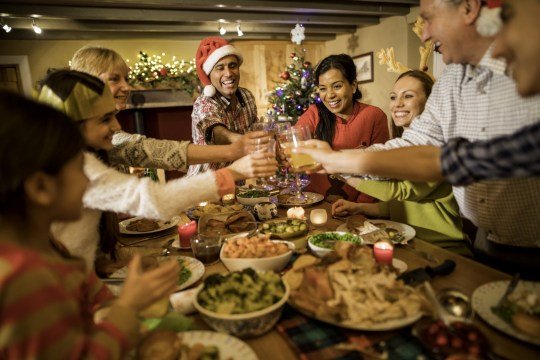
Spend less time together
She explains: ‘The longer you spend together the higher the risk of passing on the virus if you have it – and you are more likely to forget about keeping a safe distance, especially if you have an alcoholic drink.
‘If you meet outdoors or with the windows open that will stop the virus building up – and the cold will probably also remind you not to spend too long together.’
The IFH also back the idea of limiting time spent together, and has two other notable suggestions:
Think about a seating plan
It suggests arranging the festive table with different households sat apart from each other.
While that may be difficult in smaller settings, it could also make a difference if the dinner is a lengthy affair.
Social distance before meeting up
It goes without saying that you should not meet up with people if you have symptoms of the virus. But keeping your distance as much as possible and ideally self isolating entirely in the days leading up to any gathering is also advised.
Professor Bloomfield, who urges people to consider not mixing households at all, adds: ‘Do remember that we are maybe only 12-16 weeks away from being vaccinated and able to meet freely – what’s the rush?’
What won’t work
The IFH warn: ‘Trying to “deep clean your home” will have little or no effect – it’s people who spread the virus. To be effective hygiene needs to be focussed at the times and in the places that matter to break the chain of infection from one person to another.’
The Government declined to comment but have repeatedly told people to remember: ‘hands, face and space’.
Further official advice on how to stay safe outside your home can be found here.
There is also government guidance on what to do if the house has a possible or confirmed case, for shielding extremely vulnerable people and on who is most at risk, while current Christmas bubble advice is here.










